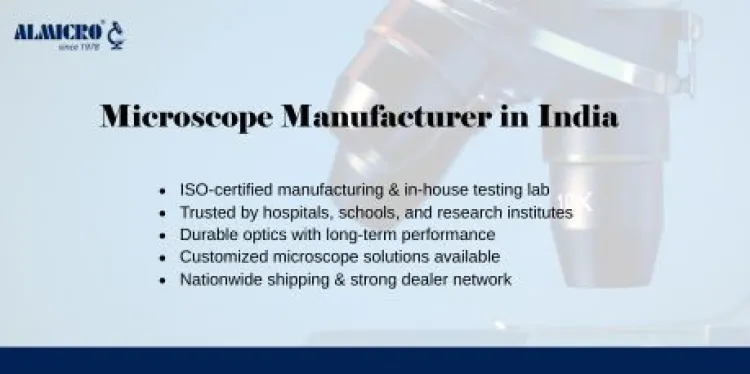
How to Identify a Reliable Microscope Manufacturer in India
Microscopes are an important tool in scientific research, clinical diagnosis, and educational institutes across India. The difficulty lies in knowing who to trust as a real partner, as there are many manufacturers to choose from. We have developed this reference guide for laboratory managers, academic institutions, researchers, and procurement teams to provide clear guidance on where to find qualified assistance, rather than another sales pitch.
If you're aiming to work with a dependable Microscope Manufacturer in India, this article will walk you through exactly what to look for.
Understand the Purpose Behind Your Microscope Purchase
Before evaluating any company, start with clarity on your own needs.
Educational vs Research vs Industrial Use
-
Academic Institutions need microscopes that are robust, easy to handle, and built for frequent use by students.
-
Research Labs require microscopes with advanced optical systems, better resolution, and modular expandability.
-
Industrial Labs may prioritize image documentation systems, digital viewing, and integration with inspection processes.
Identifying this purpose will help you eliminate manufacturers that don’t specialize in your type of usage.
Check Manufacturing Legacy & Specialization
When shortlisting a Microscope Manufacturer in India, years of experience alone aren't enough. What matters is relevance.
-
Do they manufacture only microscopes, or are microscopes just a side category?
-
Are they known in scientific circles, or just marketplaces?
-
Can they handle bulk orders while maintaining consistency?
Look for firms with a sharp focus on microscope engineering — not companies that make hundreds of unrelated lab items. A specialized manufacturer brings better know-how, tighter quality control, and greater product lifecycle support.
Evaluate Optical & Mechanical Design
This is where you separate serious manufacturers from importers and assemblers.
Ask These Key Questions:
-
Do they use true achromatic or plan objectives, or low-grade optics?
-
Are components built in-house or outsourced from generic suppliers?
-
Is there proper coaxial focusing, mechanical stage precision, and smooth movement?
Remember, a microscope is only as good as its optics and mechanics. You want clarity, consistency, and durability — not just specifications that look impressive on paper.
Seek Transparency in Technical Specifications
Authentic manufacturers don’t hide behind vague terms. They provide transparent, detailed, and verifiable specifications for every model:
-
Magnification range with real working distances
-
Numerical Aperture (NA) values
-
Light source details (LED, Halogen, etc.)
-
Eyepiece and objective compatibility
-
Options for camera integration or digital output
If any of these details are missing or sound too generic, treat it as a red flag.
Look for Real-World Industry Adoption
A reliable Microscope Manufacturer in India will always have a presence in institutions that matter.
Check for:
-
Use in government labs
-
Purchase history by reputed universities
-
Mentions in peer-reviewed journals or research papers
-
Trust by hospital diagnostic departments
Names like Almicro, for instance, are regularly referenced in both academia and healthcare sectors — a strong indicator of real-world validation.
Visit the Manufacturing Unit (If Possible)
No website or brochure can give you what a factory visit can. If you're procuring microscopes in bulk or establishing a long-term vendor relationship:
-
Ask for a visit to their facility
-
Inspect their assembly line
-
Observe quality control processes
-
Speak with the engineering or R&D team
This single step will tell you more than hours of online research.
Verify Standards & Certifications
Compliance with Indian and international standards ensures you’re buying instruments that meet performance and safety benchmarks.
Look for:
-
ISO 13485 (for medical equipment)
-
ISO 9001 (for general manufacturing quality)
-
CE markings for export-grade models
-
BIS (Bureau of Indian Standards) compliance
Don’t just take their word — ask for certificates, and check their validity.
Understand Service Infrastructure
Microscopes don’t require daily servicing, but you still want to know you're covered if something goes wrong.
-
Do they offer on-site servicing or only replacement parts?
-
Are spares readily available or imported per request?
-
Is there a real technical support desk, not just a sales line?
A reliable Microscope Manufacturer in India will have a committed support team that understands the product inside and out.
Ask for Customization Capability
Every lab has its own unique configuration needs. A good manufacturer won’t just sell you what’s in stock — they’ll offer tailored builds.
Examples include:
-
Additional camera ports
-
Enhanced LED illumination
-
Mechanical modifications for petrographic or metallurgical use
-
Digital module integration for e-learning setups
This flexibility separates true manufacturers from catalogue resellers.
Compare More Than Just Price
Microscopes are long-term assets. Don’t reduce the evaluation down to cost.
What you need to assess:
-
Clarity of imaging
-
Service timelines
-
Material durability
-
Compatibility with other lab systems
-
Upgrade pathways in the future
An authentic Microscope Manufacturer in India will help you make a future-ready investment — not just a transaction.
Look for Industry Recognition & Client Testimonials
Brands that have stood the test of time often have:
-
A solid customer base in both India and abroad
-
Repeat clients from research and healthcare
-
Recognition in industry exhibitions, expos, or academic conferences
Don’t just go by the website. Speak directly with existing customers if possible.
Final Thoughts Before You Decide
The microscope market in India is growing — and so are the choices. But reliable, proven manufacturers are still a league of their own.
Almicro, for instance, is a name that’s widely trusted across the country for its deep understanding of optical science and lab usability. They don’t just sell instruments — they partner with institutions to empower research and diagnostics.
When you go beyond surface-level specs and focus on what truly matters — transparency, design, adaptability, and legacy — you’ll find your ideal manufacturing partner.
